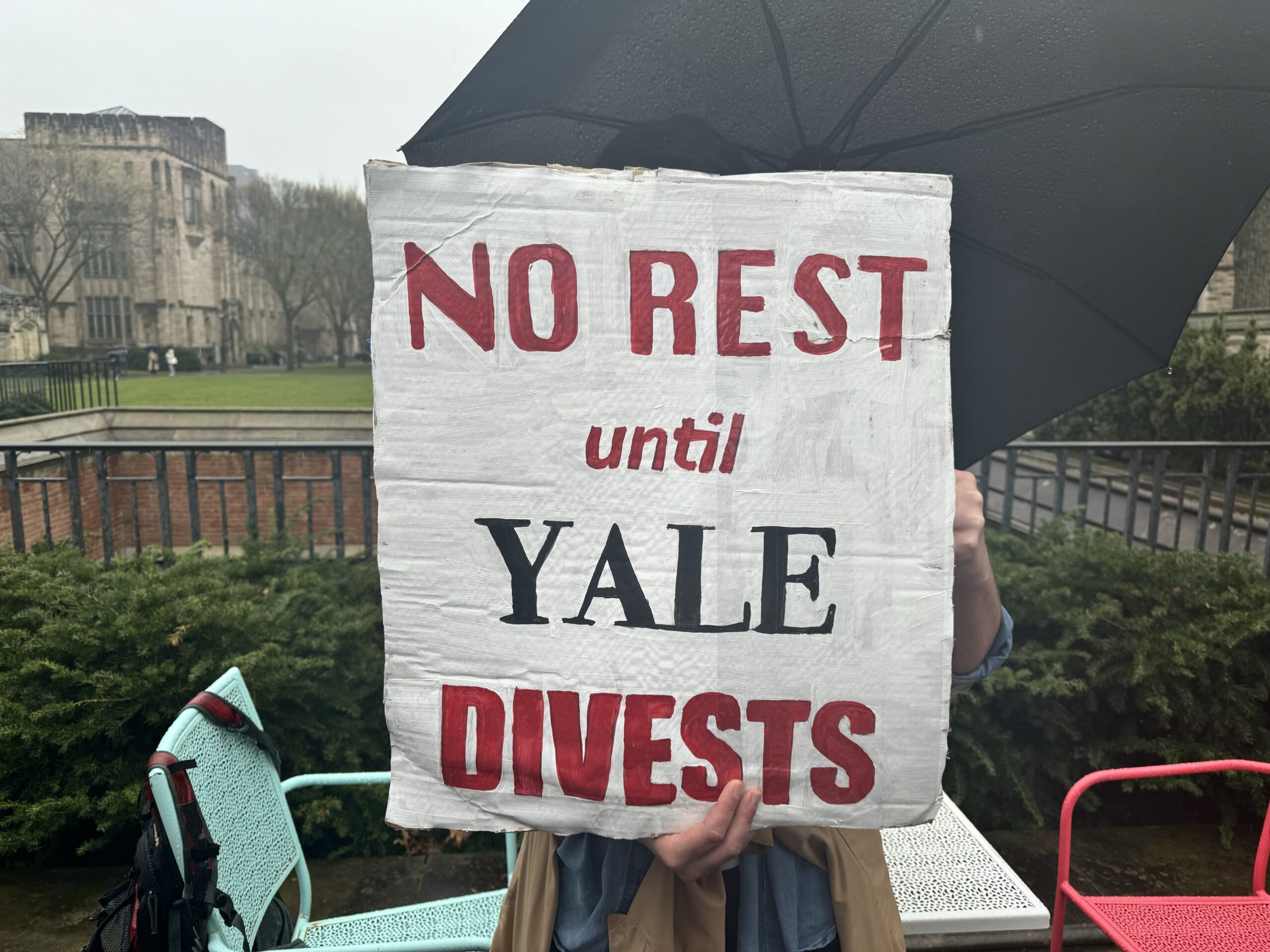University does not commit to weapons divestment, students prepare to begin hunger strike
A group of about a dozen Yalies plan to begin a hunger strike on Saturday, April 13, as part of their continued effort to demand that Yale divest from military weapons manufacturers.

Yolanda Wang, Contributing Photographer
Starting Saturday, April 13, a coalition of around a dozen Yale students will go on a hunger strike to demand that the University divest from weapons manufacturers involved in Israel’s war against Hamas in Gaza.
The coalition, called Hunger Strikers for Palestine, originally threatened to go on hunger strike in a letter they sent to University President Peter Salovey on Wednesday afternoon. The protesters set a Friday morning deadline for the University to publish a statement expressing commitment to divest from weapons manufacturers “contributing to Israel’s assault on Palestine,” the group wrote in the letter.
The University did not publish a statement on Friday morning, and student organizers announced the hunger strike at a press conference in front of Sterling Memorial Library that afternoon.
“We want to acknowledge our position as Yale University students adopting these revolutionary tactics, and we emphasize that in doing so, we wish to amplify and draw attention to the ongoing plight of Palestinians,” Jesse Goldblum, a School of Nursing student, read in a statement at the press conference on behalf of two Palestinian organizers. “We must look at the privileges and access and opulence of our university with disgust and shame.”
On Oct. 7, Hamas attacked a music festival in Israel, killing 1,200 people and taking more than 250 people as hostages. In response, Israel formally declared war on Hamas and launched a military offensive in Gaza on Oct. 27. To date, Israel’s forces have killed at least 33,360 Palestinians in Gaza, according to the Gaza Health Ministry, though experts expect thousands more people are dead under the rubble. Hamas currently holds 133 hostages, 36 of whom are confirmed dead, Israel reports.
The group of hunger strikers mainly consists of members of Graduate Students for Palestine though may also include undergraduates, per an organizer who spoke on condition of anonymity out of concern for retaliation.
“Yale is steadfastly committed to free expression and the right to peaceful protest, values that are foundational to our academic community,” Yale’s spokesperson wrote in response to the News’ request for comment.
While Yale has not divested from military weapons manufacturers, the spokesperson wrote to the News that the Yale Advisory Committee on Investor Responsibility — or ACIR — was asked in a November open meeting “to consider a policy of divestment encompassing manufacturers of military weapons.”
Both the spokesperson and ACIR chair Heather Tookes wrote to the News on multiple occasions that the ACIR has reviewed the issue and is preparing to update the Yale community “in the coming weeks.”
The strike takes place just a week before the Yale Corporation’s final meeting of the year, at which the Corporation will likely vote on the University’s next president.
Student organizers claimed that although the press conference was originally planned to take place in the Humanities Quadrangle, University administrators informed them through a message on the room reservation portal 25Live that external press outlets would not be allowed into Yale buildings “without Yale’s direct sponsorship of the event,” per the organizer.
The University spokesperson wrote that “University Staff have reached out to student organizers to provide them with resources,” including offering to help organizers find an appropriate space and encouraging students “to consult with clinicians at Yale Health.”
Belonging at Yale emailed Hunger Strikers for Palestine to let them know that a hunger strike is within students’ freedom of expression on campus, per the anonymous organizer.
The organizer also told the News that Hunger Strikers for Palestine has a group of volunteer medical professionals to support the strikers.
“No one is directly giving anyone medical advice in [a professional] capacity,” the organizer said. “But we have compiled a list of precautions or preliminary tests people should take and what people should or should not consider in their voluntary choice to go on hunger strike.”
Participants in the hunger strike emphasized that the strike is voluntary and meant to draw attention to the divestment cause.
“Whatever it is that we might put ourselves through is something that can be stopped at any time,” Miguel Monteiro, a Ph.D. student in Near Eastern Languages & Civilizations, told the New Haven Independent. “We have medical protection, it’s our own choice — it’s a drop in the ocean to what’s being inflicted upon Gaza. We hope that this small act of self-sacrifice will help not only the Yale Corporation but the larger world community to pay attention.”
Yale Corporation meeting minutes are sealed from the public for 50 years.







